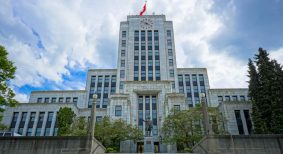Construction companies know how important it is to control costs. However, British Columbia’s municipalities don’t seem to share the same sentiment.
Municipal government is costing the public more. Since 2000, civic spending (adjusted for inflation) has increased 46 per cent. Over the same time, the population grew 12 per cent. In other words, spending has grown four times faster than the population.
Civic politicians pay for this spending through taxes. Since 2007, municipal taxes have increased approximately three times the rate of inflation. The average civic tax bill has grown 17 per cent, while inflation grew almost six per cent.
Municipal spending is also funded through higher fees on, for example, building permits, development cost charges, sewer hook-ups and rezoning fees. These charges have risen, on average, 128 per cent since 2001, across B.C. This is almost seven times the 19 per cent inflation in the same period.
What’s fuelling the rise in municipal spending and the escalation of taxes and fees?
On average, municipal workers are paid 30 to 40 per cent more than people who do the same work in the private sector. For instance, City of Vancouver plumbers make between $30.25 and $34.50 an hour, while private sector wages are $29 to $31.47 an hour. In the City of Burnaby, carpenters make $30.25 to $33.95 an hour. In the private sector, the average wage is between $25.06 and $31.41.
But higher wages are just part of the equation. Municipality compensation costs are sky high because of benefits like longer holidays, more sick days, the ability to bank sick days for an extra six months of pay and “gratuity days.”
What’s a gratuity day?
In the City of Vancouver, employees get one “gratuity day” for each four-month period that they aren’t off sick. They are allowed to accumulate up to a maximum of 120 days. When they retire, they can cash out the accumulated time, which is equivalent to a half-year of pay.
The problem extends to management at most city halls. For comparison, U.S. President Obama’s Chief of Staff, Denis McDonough, makes $172,000 a year. In B.C., city managers or chief administration officers in Burnaby, Delta, Kamloops, Kelowna, Langley City, Maple Ridge, the District and the City of North Vancouver, Pitt Meadows, Surrey, Vancouver, Victoria, West Vancouver, and White Rock make more than this. Adding insult to injury, top brass at Victoria City hall have received pay increases of up to 76 per cent since 2007.
What can be done to curb runaway pay in the public sector?
Construction companies and taxpayers can start raising their voices and pressure elected leaders to bring pay and benefits in line with the private sector.
Further, it is time for public-private compensation equity legislation. This would restore balance to the compensation earned by municipal workers and put government spending on a sustainable footing.
Philip Hochstein is president of the Independent Contractors and Businesses Association (ICBA) of B.C.









